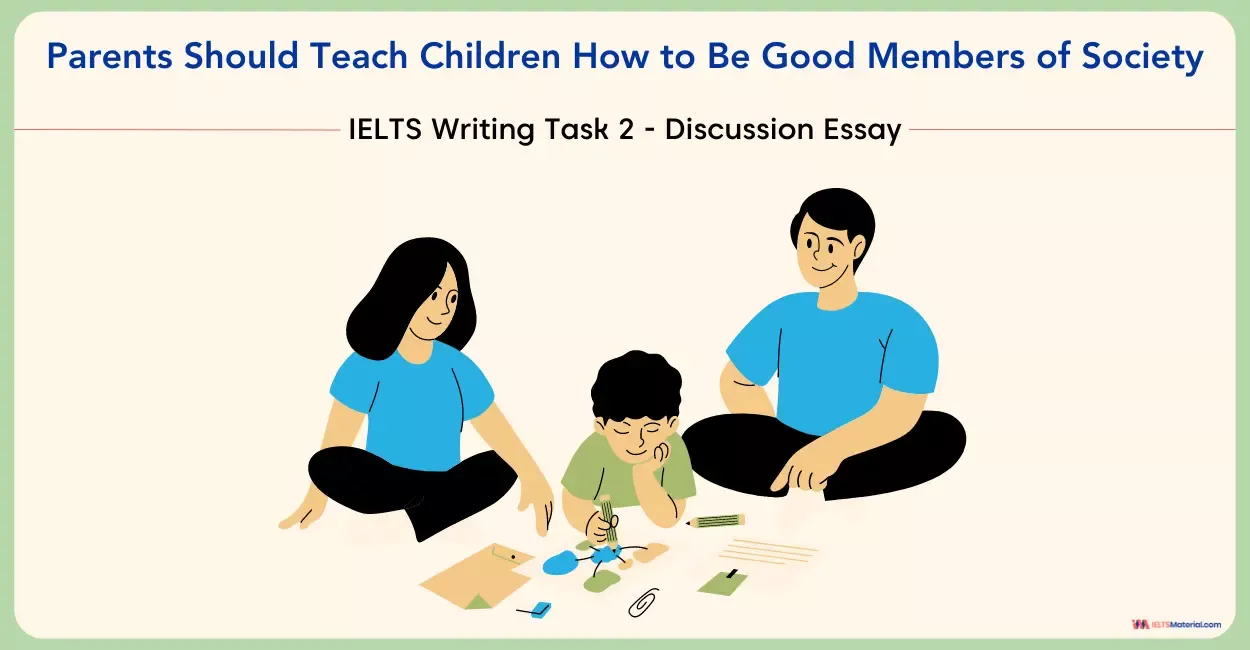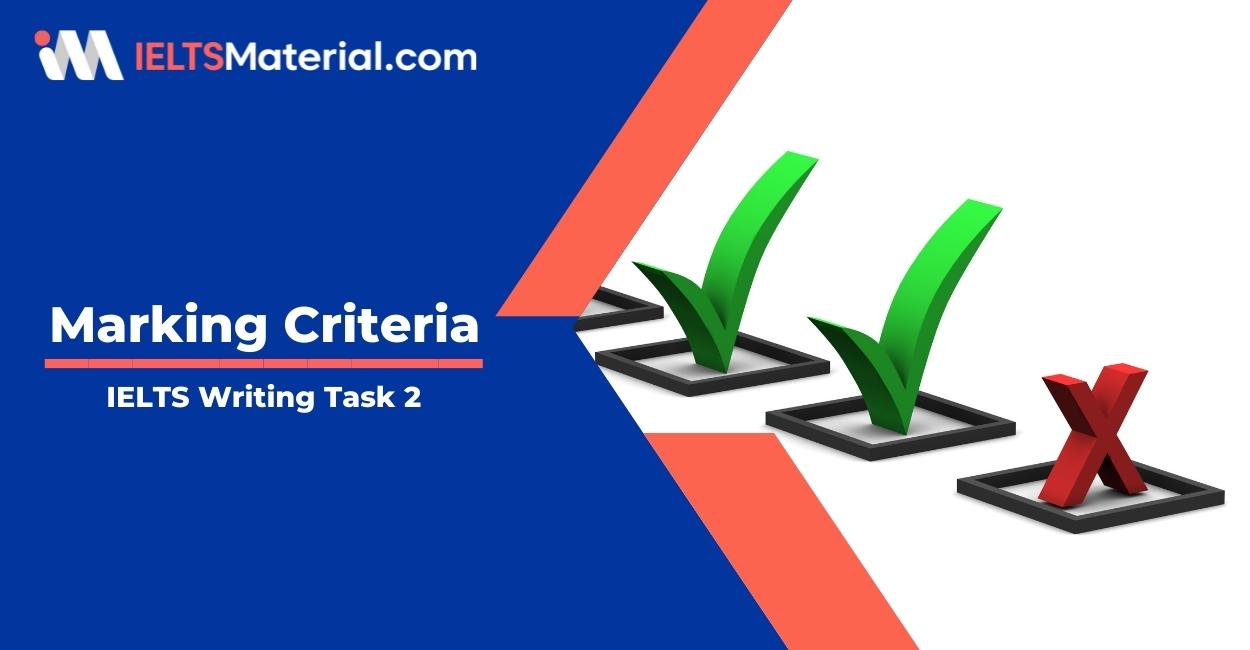IELTS Writing Task 2 Marking Criteria
Table of Contents
Limited-Time Offer : Access a FREE 10-Day IELTS Study Plan!
IELTS Writing Task 2 is the second writing task and is worth around 66% of the total writing marks as opposed to task 1 which is worth around 34%. Both, the IELTS General Training as well as the IELTS Academic have questions posed the same way in writing task 2. In this task, you’ll have to write a 250-word essay, for which you’ll have a time limit of 40 minutes. Once done, you’ll be assessed and scored based on 4 marking criteria
- Task Response – 25%
- Vocabulary – 25%
- Grammatical Accuracy – 25%
- Coherence and Cohesion – 25%
IELTS Writing Task 2 Band Score
| Assessing Elements | Band 5 | Band 6 | Band 7 | Band 8 |
|---|---|---|---|---|
| Task response |
|
|
|
|
| Coherence & Cohesion |
|
|
|
|
| Lexical Response |
|
|
|
|
| Grammatical Range & Accuracy |
|
|
|
|
Task Response
One aspect that the examiner will definitely be looking for is whether the issues mentioned in the question are addressed in your summary. Some tips to follow are
Plan your key points
This is an important tip to remember. Don’t start writing your summary in a hurry. Spend a few minutes reading and understanding the question. After reading, start planning the key points that you want to add in your summary. This’ll help in not deviating and missing out the important points.
Stick to the word limit
It’s very important to stick to the given word limit. For writing task 2, the word count given is 250 words, which means your summary should be of at least 250 words. Remember, marks will be deducted if the word count is less than 250.
Address all the issues in the essay question
Make sure to read the question a few times to have an understanding of what is required. Once you’ve understood the question, make sure to address all the issues mentioned in the question, in your summary. The examiner will definitely be checking for the same.
Vocabulary
It’s very important to practice your vocabulary to use a variety of words and not make any spelling mistakes. Some tips are given below
Avoid spelling mistakes
It’s necessary to practice to avoid making spelling mistakes in the test. Making mistakes in spelling can lead to marks being reduced, that’s why you should practice, to be more confident during the test.
Range in vocabulary
Having a range in vocabulary basically means knowing how to use less common words in the right way. It also includes knowing how to use nouns and verbs correctly while writing. It’s important to focus on these factors to make your content more readable.
Using collocations in the right way
What is a collocation? It is two or more words that are often said together. More often than not, between the two words, one of them will be a noun and the other will be a verb. For example, when it’s raining a lot, you can call it a ‘heavy rain’ but you can’t say it’s a ‘large rain’. You can learn the commonly used collocations by listening to English speaking speakers or reading English content in newspapers, magazines, etc
Avoid using informal language or slang
While practising, you should try to pick up on a formal and respectful way of speaking and writing. Avoid, at all cost, using informal or slang language during this test.
Grammatical Accuracy
It’s important to remember that grammatical accuracy accounts for 25% of the total marks for the writing test. So make sure to focus on your control of grammar, sentence structure, and punctuation.
Avoid basic grammatical errors
To avoid the basic grammatical errors in your content, you should focus on learning the difference between, verb, adverb, nouns, adjectives and so on. Make sure to understand what they mean and how they’re used.
Using punctuations correctly
Punctuation marks are basically language aids that help with the interpretation of the text. Punctuation marks are used everywhere in content, the most common ones being full stop, commas, and question marks.
Use the right verb tense
An important aspect of grammatical accuracy is knowing how to use the right verb tenses according to the context. There are three verb tenses, the past tense, which is used for things that have already happened, the present tense that is used for things that are currently happening, and the future tense, which is used to describe things that haven’t happened yet.
Coherence and Cohesion
While writing the summary you should make sure to follow the proper content structure and use the right linking devices according to the context. Some tips to follow are
Proper Content Structure
One of the most important things to remember while writing the essay is to make sure you’re following the proper content structure, i.e you have to write 4-5 paragraphs. The first paragraph should be the introduction. After that, should be 2 – 3 body paragraphs, depending on how much you plan to write about it. Finally, the last paragraph should be the conclusion paragraph.
Organize the content
The essay should have 4-5 paragraphs, so it’s important to remember what to write in which paragraph. The first paragraph will be the introduction paragraph, so it should contain a brief description of all the key points you’re planning to cover in the essay. After that is the body paragraphs, and there can be 2 or 3 body paragraphs depending on how you wish to write it. The body paragraphs should contain all the key issues that are mentioned in the question.
And then finally the last paragraph should be the conclusion paragraph, where you conclude the essay.
Use a range of linking devices/ transition words
Linking devices are words used to help link sentences and paragraphs together so that the content is more readable and there is continuity while reading. Examples of transition words are ‘as’, ‘and’, ‘like’, ‘as well as’, ‘likewise’ and so on. Make sure to learn how to use these transition words in the right way.
Also check :
Practice IELTS Writing Task 2 based on Essay types
Start Preparing for IELTS: Get Your 10-Day Study Plan Today!
Eplore other Writing Task 2 Articles

Kasturika Samanta

Akanksha Tripathi
Recent Articles


Raajdeep Saha
Kasturika Samanta

Akanksha Tripathi




Post your Comments